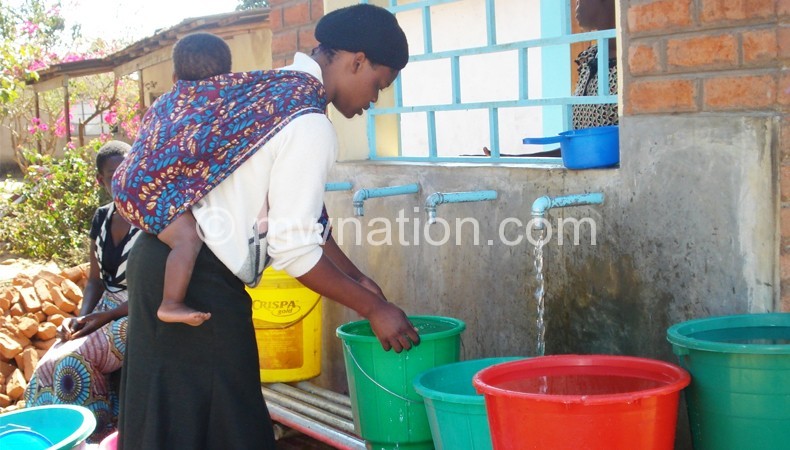Frowns of Karonga Nyungwe

Lack of potable water still affects people of Karonga, especially in Karonga Nyungwe Constituency. Why is the area lagging behind? James Chivula investigates
“Pupils often report for classes very late and tired since they have to help their parents fetching water before coming to school.
“The lakeshore area usually experiences scorching heat and the learners need water frequently. When thirst hits, they have to rush home and some of them do not come back for remaining lessons.”
In the past five years, Paladin Africa Limited, the firm mining Uranium at Kayerekera in the district, drilled a borehole to reverse the plight of children.
Unfortunately, the water point has ended being a white elephant—shunned, ridiculed and hardly ever used—since it produces undrinkable salty water. Teachers at Nyungwe also bemoaned that the salty gushes are threatening the life span of their clothes and makes nsima yellowish.
In an interview, community health worker Future Mzumara recounted how the huge crowd who dazed a dentist who visited Nyungwe Health Centre last year.
He said: “When the people heard about the coming of the teeth specialist, they turned out in large numbers thinking it could be the end of their problem. However, the dentist was dazedbecause most of the clients’ teeth were intact despite looking rotten. There was nothing they could do to save the situation.”
As the tale of yellow teeth reaches a rotten climax, the Ministry of Water Development rates Karonga “above average” in terms of access to drinking water.
When asked about the water situation in Karonga, the ministry’s spokesperson James Kumwenda cited the 2011 Welfare Monitoring Survey by the National Statistical Office which indicates 95.3 percent of the district’s population has access to potable drinking water sources.
Said Kumwenda: “This is above the national average of 83.7 percent. What this means is that Karonga is one of the districts that is doing better as regards access to potable water supply services.”
The publicist reckons the ministry, in coordination with its development partners, is working hard not to only achieve its vision of water for all always in the district but also across the country and ensure that all the installed water facilities are functioning at all times.
Locals in Karonga say there are gaping disparities between the figures on paper and the situation on the ground where most of the boreholes are rusting due to breakdown and disuse.
Those in Nyungwe are primarily are concerned that some of the drinking water the majority are able to access is actually exposing them to stigma and discrimination.
The Catholic Commission for Peace and Justice (CCJP)rates poor access to safe and quality water a major challenge in Karonga. Among other initiatives, the commission is running a project which empowers locals to demand accountability and transparency when it comes to development. Through community outreaches, a consensus is gaining sway among affected communities in Nyungwe, Lupembe and Chilumba that development is a right.
On the teeth-unfriendly water in some parts of the district, CCJP desk officer in Karonga Diocese Mwawi Shaba said: “The people have the right to demand quality water because when they say water is life, they mean it is important for their bodies to function properly.
“As an institution which champions the interest of those sidelined, we feel government has the responsibility to reduce the numbers of people with no access to safe water and to ensure those with access are not being exposed to harmful substances. Clearly, scaling up provision of tap water seems to be the way to stop the Nyungwe scenario.”
In 2010, only 4 800 people were connected to Northern Region Water Board (NRWB) in Karonga. The board’s public relations manager Edward Nyirenda said the water supply system has expanded to 6 400 lately.
This means the people can only access tap water if they travel 45 kilometres northwards to Karonga Boma or 30 kilometres southwards to Chilumba.
The gap has left people ruing government for failure to honour legitimate expectation created by their promise to provide safe water to communities in the district.
NRWB credits the multibillion Garnett Halliday Water Supply Plant at Karonga Boma, erected by Paladin Mining Company for weaning them from pumping water using problematic boreholes whose water was saltier than that the machine taps from Lake Malawi.
“The water from the lake is far much better than the one we were getting from boreholes,” says Nyirenda, adding the new plant uses the filter system that delivers water the quality that can be bottled right away.
The water supply plant has the capacity to pump 7 600 cubic metres per day at a time NRWB estimates Karonga’s demand for tap water at 5 000 cubic metres daily. The boreholes were pumping 3 000 cubic metres a day.
The people with rusty teeth in Karonga Nyungwe and Karonga Central want a taste of the overage—the 2 600 cubic metres of tap water—NRWB hardly supplies to the customers as it has yet to expand the water distribution system even though the pumping and treatment capacity has gone up drastically.
As government strives to halve the number of people with no access to safe water, in line with Millennium Development Goals whose deadline is next year, they want supply of teeth-friendly water to be part of the national agenda. This entails scaling up the tap water system.





